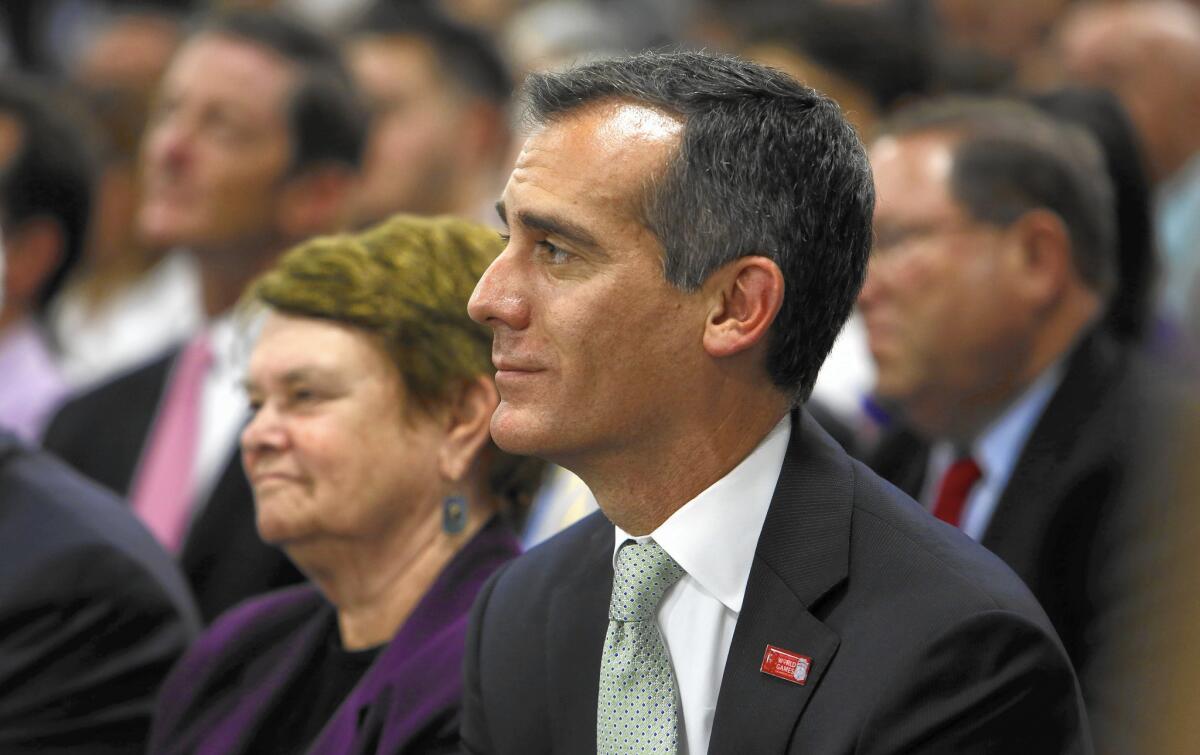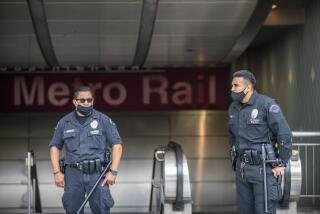First & Spring: Campaign money has MTA board members missing votes

L.A. Mayor Eric Garcetti recused himself from dozens of Metro board votes last year as he sought to comply with one of the state’s most restrictive rules on campaign contributions.
- Share via
When the Metropolitan Transportation Authority took up an agreement last year for a new walking path in East Los Angeles, Mayor Eric Garcetti had to excuse himself from the vote.
When the agency’s 13-member board awarded contracts for sound walls along the 710 Freeway, the mayor also took a pass. And when an agreement was approved for a new parking lot near Burbank’s airport, Garcetti again withdrew from the board’s deliberations.
Garcetti recused himself from dozens of Metro board votes last year as he sought to comply with one of the state’s most restrictive rules on campaign contributions. Politicians on the board are prohibited from participating in decisions on contracts if they have received campaign contributions of more than $10 from the companies seeking the work.
In all, Garcetti recused himself 56 times in 2014, according to a Times review of Metro board meeting minutes. One of his appointees, Councilman Mike Bonin, withdrew from 34 contract decisions. L.A. County Supervisor Michael D. Antonovich stepped aside on 19 votes.
A Metro spokesman said “nearly all” the board’s recusals are caused by campaign contributions, rather than personal financial conflicts of interest.
For ethics experts, the practice of missing votes poses a question: Does it mean the system is working, because politicians are staying away from the decisions that affect their campaign donors? Or does it show that it’s broken, because board members repeatedly miss major financial decisions?
Kathay Feng, executive director of the watchdog group California Common Cause, thinks the answer is somewhere in between. It’s good to see Metro board members avoiding votes on contracts involving their campaign contributors, she says. But she also argues there’s a simpler and better way to eliminate the recurring conflicts on the board.
“Don’t take the money,” she said. “But it’s very hard to tell a politician that.”
Garcetti campaign consultant Bill Carrick said the mayor has an “extensive” process for avoiding taking contributions from Metro contractors. The campaign team consults Metro’s list of contractors as part of the vetting process, he said. But at times, the mayor’s team isn’t aware that a donor, or the donor’s employer, is going to compete for Metro transportation work later, Carrick said.
Every recusal by the mayor appears to have been triggered by campaign contributions, said Garcetti spokeswoman Connie Llanos. Bonin and Antonovich confirmed that their missed votes were also triggered by campaign donations.
Bonin said he did not know that when he was running for office in 2013 — and accepting donations from people with Metro ties — he would later be selected by Garcetti to join Metro’s 13-member board. “As a Metro board director, he now avoids contributions that he knows would create conflicts in the future,” Bonin spokesman David Graham-Caso said.
The state Legislature approved Metro’s campaign contribution law in 1997, one in a series of measures aimed at reforming the transportation agency. At the time, Metro’s construction of a subway line to North Hollywood was plagued with cost overruns and construction mishaps, including the work-related deaths of two construction workers.
Then-State Sen. Tom Hayden, who wrote the Metro contribution law, said at the time that campaign contributions were the “fundamental reason” for bad decision-making by the board. His bill restricted donations from not just Metro contractors but also their employees and their employees’ family members. Recusals were required for contributions that had occurred in the previous four years.
Garcetti’s recusals have touched on projects in nearly every section of Los Angeles, including a 405 Freeway ramp on the Westside, a pedestrian bridge in Universal City and a subway link being built in downtown L.A.
Llanos, the Garcetti spokeswoman, says the mayor’s missed votes had no effect on his larger transportation agenda. Because the agency’s meetings are quite long — some have more than 70 items on a single agenda — he still participated in a “significant majority” of its decisions, including the launch of a bike-share program and the creation of a new rail link to Los Angeles International Airport, she said.
“Nearly all of the votes he recused himself from were approved unanimously,” Llanos said. “These efforts go above and beyond what the law requires and have in no tangible way impacted his performance.”
Garcetti hasn’t completely avoided fundraisers involving transportation vendors. Last month, he held a fundraiser for his non-campaign officeholder committee — an account that pays for some of his meals, travel and appearances — that was co-hosted by two Metro contractors.
One event co-host was Christine Robert of the Robert Group, which has a contract to provide public outreach for Metro’s Westside subway project. The board voted this year, with Garcetti recusing himself, to increase her firm’s contract from about $3.5 million to more than $3.7 million.
Another co-host was Del Richardson, whose firm received a $646,462 contract last year to help small businesses affected by the Crenshaw/LAX rail construction project. Richardson is Councilman Curren Price’s wife. Garcetti voted in favor of the agreement.
Garcetti has received legal advice saying that officeholder fundraisers are not covered by Metro’s fundraising rules. In addition, neither Richardson nor Robert wrote checks to Garcetti’s committee as a result of his recent event, Llanos said.
“We have followed the letter and spirit of the law,” she said.
More to Read
Sign up for Essential California
The most important California stories and recommendations in your inbox every morning.
You may occasionally receive promotional content from the Los Angeles Times.











